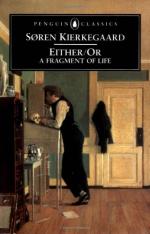|
This section contains 4,788 words (approx. 16 pages at 300 words per page) |

|
SOURCE: Koelb, Clayton. “Wrestling with Proteus: Irony in Kierkegaard's Either/Or.” In Narrative Ironies, edited by A. Prier and Gerald Gillespie, pp. 21-31. Amsterdam: Rodopi, 1997.
In the following essay, Koelb explores Kierkegaard's use of irony in Either/Or, particularly in his discussion of Eugène Scribe's The First Love.
The love of recollection is the only happy love, says an author who, so far as I am acquainted with him, is sometimes rather deceitful.
Søren Kierkegaard
Irony prefers oblique refraction. It says not so much the opposite to what is meant as something other than. …
Lilian R. Furst
The first quotation is an example of the oblique, refractive irony Lilian Furst refers to in the second.1 The irony resides in the fact that the “rather deceitful” author being quoted in these opening lines from “Repetition” is none other than Søren Kierkegaard himself, so that the judgment...
|
This section contains 4,788 words (approx. 16 pages at 300 words per page) |

|


